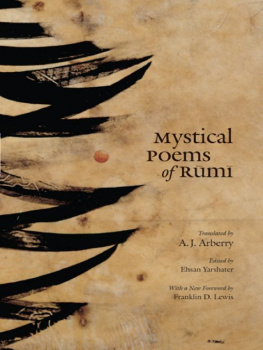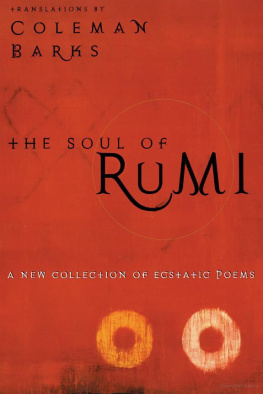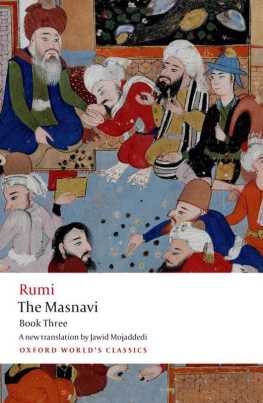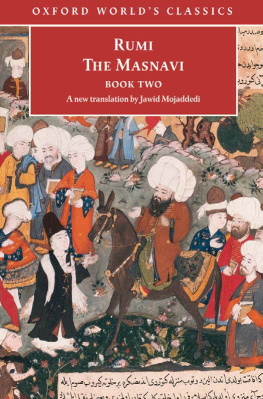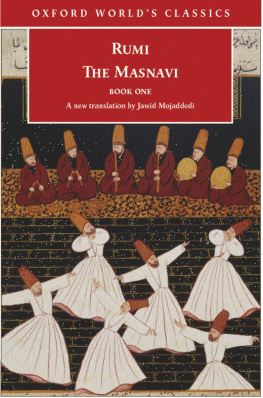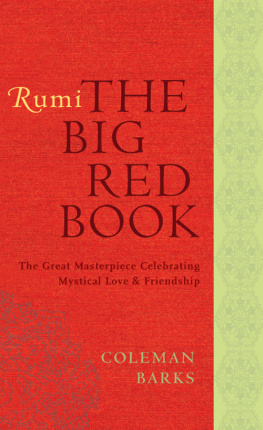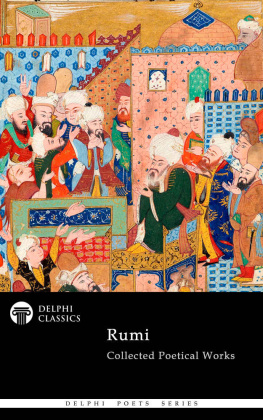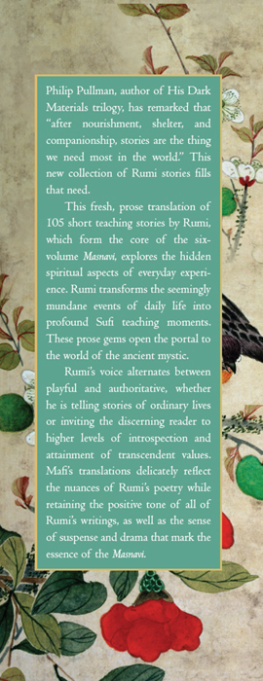Jalal al-Din Rumi - Masnavi Book 4
Here you can read online Jalal al-Din Rumi - Masnavi Book 4 full text of the book (entire story) in english for free. Download pdf and epub, get meaning, cover and reviews about this ebook. year: 2017, publisher: OUP Oxford, genre: Religion. Description of the work, (preface) as well as reviews are available. Best literature library LitArk.com created for fans of good reading and offers a wide selection of genres:
Romance novel
Science fiction
Adventure
Detective
Science
History
Home and family
Prose
Art
Politics
Computer
Non-fiction
Religion
Business
Children
Humor
Choose a favorite category and find really read worthwhile books. Enjoy immersion in the world of imagination, feel the emotions of the characters or learn something new for yourself, make an fascinating discovery.

- Book:Masnavi Book 4
- Author:
- Publisher:OUP Oxford
- Genre:
- Year:2017
- Rating:5 / 5
- Favourites:Add to favourites
- Your mark:
- 100
- 1
- 2
- 3
- 4
- 5
Masnavi Book 4: summary, description and annotation
We offer to read an annotation, description, summary or preface (depends on what the author of the book "Masnavi Book 4" wrote himself). If you haven't found the necessary information about the book — write in the comments, we will try to find it.
Masnavi Book 4 — read online for free the complete book (whole text) full work
Below is the text of the book, divided by pages. System saving the place of the last page read, allows you to conveniently read the book "Masnavi Book 4" online for free, without having to search again every time where you left off. Put a bookmark, and you can go to the page where you finished reading at any time.
Font size:
Interval:
Bookmark:
Rumi expressed his new vision of reality in volumes of mystical poetry. His enormous collection of lyrical poetry is considered one of the best that has ever been produced, while his poem in rhyming couplets, the Masnavi, is so revered as the most consummate expression of Sufi mysticism that it is commonly referred to as the Quran in Persian. When Rumi died, on 17 December 1273, shortly after having completed his work on the Masnavi, his passing was deeply mourned by the citizens of Konya, including the Christian and Jewish communities. His disciples formed the Mevlevi Sufi order, which was named after Rumi, whom they referred to as Our Lord (Turkish Mevlana, Persian Mowlana). They are better known in Europe and North America as the Whirling Dervishes, because of the distinctive dance that they now perform as one of their central rituals. Rumis death is commemorated annually in Konya, attracting pilgrims from all corners of the globe and every religion.
The popularity of his poetry has risen so much in the last couple of decades that the Christian Science Monitor identified Rumi as the most published poet in America in 1997. The popularity of Rumis poetry in English translation has spread to Europe more recently, and UNESCO designated the commemoration of the eight hundredth anniversary of Rumis birth in 2007 as an event of major international importance. Jawid Mojaddedi , a native of Afghanistan, is Professor of Religion at Rutgers University. He was a 201415 National Endowment for the Arts Literature Translation Fellow. Dr Mojaddedis translation, The Masnavi: Book One (Oxford, 2004), was awarded the Lois Roth Prize by the American Institute of Iranian Studies.
Now with over 700 titlesfrom the 4,000-year-old myths of Mesopotamia to the twentieth centurys greatest novelsthe series makes available lesser-known as well as celebrated writing. The pocket-sized hardbacks of the early years contained introductions by Virginia Woolf, T. S. Eliot, Graham Greene, and other literary figures which enriched the experience of reading. Today the series is recognized for its fine scholarship and reliability in texts that span world literature, drama and poetry, religion, philosophy, and politics. Each edition includes perceptive commentary and essential background information to meet the changing needs of readers.
Oxford Worlds Classics Jalal Al-Din Rumi
Paul E. This volume is dedicated to the memory of
Paul E.
Weber
(d. 25 February 2016)
He not only produced the finest Sufi poetry in Persian, but was also the master of disciples who later named their order after him. Moreover, by virtue of the intense devotion he expressed towards his own master, Shams-e Tabriz, Rumi has become the archetypal Sufi disciple. From that perspective, the unprecedented level of interest in Rumis poetry over the last couple of decades in North America and Europe does not come as a total surprise. Rumi lived some 300 years after the first writings of Muslim mystics were produced. A distinct mystical path called Sufism became clearly identifiable in the ninth century and was systematized from the late tenth and eleventh centuries. The authors of these works, who were mostly from north-eastern Persia, traced the origins of the Sufi tradition back to the Prophet Mohammad, while at the same time acknowledging the existence of comparable forms of mysticism before his mission.
They mapped out a mystical path, by which the Sufi ascends towards the ultimate goal of union with God and knowledge of reality. More than two centuries before the time of the eminent Sufi theosopher Ebn Arabi (d. 1240), Sufis began to describe their experience of annihilation in God and the realization that only God truly exists. The illusion of ones own independent existence began to be regarded as the main obstacle to achieving this realization, so that early Sufis like Abu Yazid Bestami (d. 874) are frequently quoted as belittling the value of the asceticism of some of their contemporaries on the grounds that it merely increased attention to themselves. An increasing number of Sufis began to regard love of God as the means of overcoming the root problem of ones own sense of being, rather than piety and asceticism.
Font size:
Interval:
Bookmark:
Similar books «Masnavi Book 4»
Look at similar books to Masnavi Book 4. We have selected literature similar in name and meaning in the hope of providing readers with more options to find new, interesting, not yet read works.
Discussion, reviews of the book Masnavi Book 4 and just readers' own opinions. Leave your comments, write what you think about the work, its meaning or the main characters. Specify what exactly you liked and what you didn't like, and why you think so.

